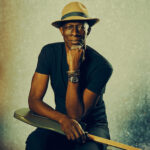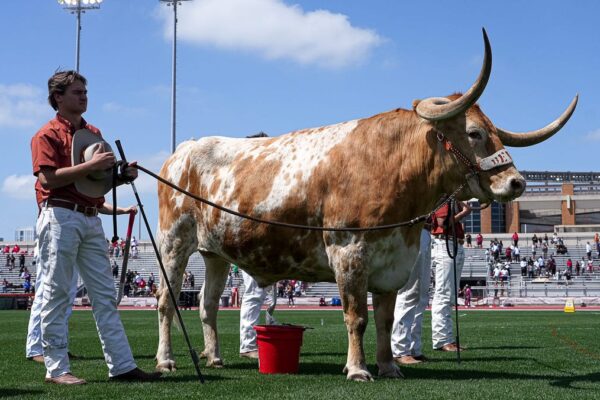Andover Newton at YDS partners with management school to provide business training for M.Div. students
By Timothy Cahill ’16 M.A.R.
In the spring of 2020, Trevor Smith was on the express elevator up to the lucrative world of investment banking. Only a year and a half out of college, Smith was part of an exclusive leadership program at the financial services company Wells Fargo, being groomed for a career in corporate leadership. “I was flying around the country, meeting corporate leaders, networking,” he recalled of that time. “Everything was moving fast.”
Then came Covid-19. And the shutdown. When Wells Fargo suspended its program, Smith found himself with time to take stock of his life—and a potent moment of revelation.
“Something deep inside me was unfulfilled,” he said, recalling his epiphany. Amid the rewards and seductions of worldly success, it had been easy to deny this deeper truth. But pandemic seclusion provided Smith with countless hours to contemplate an awareness that, long before joining Wells Fargo, he had “felt a calling to devote myself to doing something meaningful in the world.” This was no mere abstract notion to do good. It was a voice that was once more growing loud in his heart.
“That small whisper from God becomes a roar pretty quick,” he discovered.
The realization inspired Smith to pivot away from banking, but it didn’t mean turning his back on business. He’d majored in Business Administration as an undergraduate at the University of North Carolina at Chapel Hill, with a minor in religion. Now, he wanted to find a way to use his knowledge of corporate culture in service of Christian faith and humanitarianism.
His search led him to Andover Newton Seminary at Yale Divinity School, where Smith matriculated as a Master of Divinity candidate in the fall of 2021.
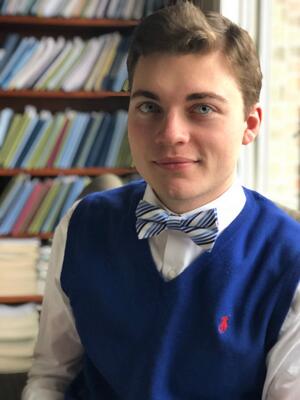 Andover Newton Seminary (ANS), formerly the Andover Newton Theological School, affiliated with YDS in 2017, and has accepted students into its certificate program since Fall 2018. Smith was attracted by Andover Newton’s 215-year history in congregational education, but it was more than tradition that drew the budding philanthropist to New Haven. It was innovation as well, in the partnership forged between ANS and the Yale School of Management (SOM), the university’s world-class business school.
Andover Newton Seminary (ANS), formerly the Andover Newton Theological School, affiliated with YDS in 2017, and has accepted students into its certificate program since Fall 2018. Smith was attracted by Andover Newton’s 215-year history in congregational education, but it was more than tradition that drew the budding philanthropist to New Haven. It was innovation as well, in the partnership forged between ANS and the Yale School of Management (SOM), the university’s world-class business school.
Pragmatic response
While business electives are not uncommon in theological schools, and a few programs offer dual degrees in divinity and business, Andover Newton is the country’s first seminary to require all M.Div. graduates to take classes in business administration. The requirement sends divinity students into what for many is the alien culture of the School of Management, where the idea of a higher power rests more in capitalism’s “invisible hand” than in God’s protective grace.
The inclusion of business courses into divinity education is a pragmatic response to a fraught reality. For decades, mainline Protestant denominations have been in steady decline. Pews grow emptier, churches are sold to developers, and even storied seminaries face uncertain futures. Under such difficult economic conditions, familiarity with business management becomes for seminarians a matter of simple survival.
The nexus between ANS and SOM is the work of Sarah Drummond ’93 BA, the founding dean of Andover Newton’s New Haven incarnation. Drummond described the genesis of the partnership in a 2020 article for The Christian Century.
Drummond has been with Andover Newton since joining its faculty in 2005. She wrote in her article that in planning the move to YDS, she invited alumni and outside religious leaders to reimagine ANS in the context of Yale. Nearly everyone who responded, she said, “named as a potential area of curriculum growth the idea of teaching the leadership skills needed to direct a nonprofit business. …. So we wondered: What would it be like to include business school courses in an M.Div. curriculum?”
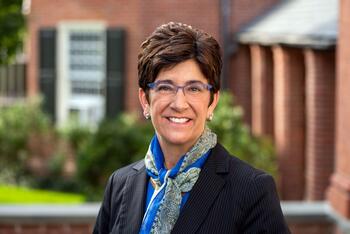 Drummond, a minister in the United Church of Christ, had personal knowledge of the advantages of business study. As part of her PhD work on foundation-funded campus ministry, she’d taken a course in nonprofit fundraising. “And then I failed the midterm,” she confessed in her article. “I offered moral analysis … rather than actually answering the questions posed by the professor.”
Drummond, a minister in the United Church of Christ, had personal knowledge of the advantages of business study. As part of her PhD work on foundation-funded campus ministry, she’d taken a course in nonprofit fundraising. “And then I failed the midterm,” she confessed in her article. “I offered moral analysis … rather than actually answering the questions posed by the professor.”
The experience taught her the difference between coming at questions like an M.Div. and like a business-school student—an insight that later informed her thinking as a professor and an administrator. She completed the fundraising course with an A.
Nevertheless, Drummond wrote, she initially resisted requiring business courses at Andover Newton, believing students needed “every second, every credit, every course” of theological study they could get. The move to Yale offered an opportunity to reassess. The School of Management has a “world-class reputation around nonprofit leadership and missional management,” Drummond said in a recent interview.
The business school’s website declares, “A successful SOM career is measured in how it ultimately affects lives and strengthens communities.” This emphasis on values, Drummond said, attracts “passionaries,” as she puts it—people “who want to make a difference in spheres where the bottom line is transformation.”
Such values dovetailed naturally with the mission of ANS and helped lead the seminary to its requirement of at least 4.5 credit hours in management training. Most courses are taken at SOM, although there are a limited number of leadership classes at YDS, including one on change management taught by Drummond.
Drummond sees several advantages in the requirement. “The main concern,” she said, “is that our students learn enough about business and management that, when they [are] on their own in their [ministry] work, they’ve got the essential building blocks” to tackle business-related questions.
“I’m a real believer in on-the-job learning,” Drummond continued, “but given the high-stakes pool that’s being played in ministry right now—sometimes our students go into settings that are super-fragile, or that they’re running pretty much on their own—we want to set them up to succeed.”
Instilling confidence
Besides basic business skills, Drummond said, the SOM experience gives divinity students more confidence for operating effectively in the cold-eyed world of money.
“I wanted to demystify MBA programs,” said Drummond, referring to the Masters of Business Administration, the standard professional business degree. “Religious leaders always have MBAs on their board. Church leaders always have MBAs in their congregation. Sometimes, people who’ve earned MBAs [try] to be overly influential … and use the fact that they have an MBA as a wedge: ‘I’m the one who really understands what it takes to make an organization thrive.’”
Preparing new minsters to be more surefooted in such instances, “was one of the reasons I wanted them to have the experience,” Drummond said.
Did she have concerns about the ability of ANS students to function in a business-school environment?
“Oh, I never worried for one second about that,” she answered instantly. “Not one second.”
For one thing, Drummond explained, “divinity school classes are very, very hard. They require large amounts of reading on abstract topics and demand sophisticated, even existential analysis on a daily basis.”
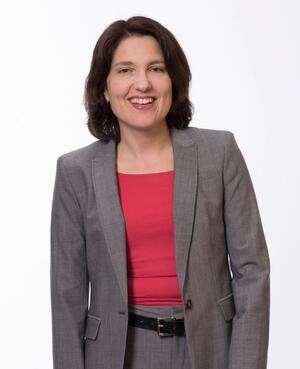 It is true that many M.Div. students arrive knowing next to nothing about accounting, economics, or business, and remedial work is necessary at the beginning of some courses. Yet, far from being left behind, YDS students establish a give-and-take with their business counterparts that SOM professor Judy Chevalier ’89 B.A. described as “complementary.”
It is true that many M.Div. students arrive knowing next to nothing about accounting, economics, or business, and remedial work is necessary at the beginning of some courses. Yet, far from being left behind, YDS students establish a give-and-take with their business counterparts that SOM professor Judy Chevalier ’89 B.A. described as “complementary.”
Chevalier’s course Strategic Management of Nonprofit Organizations is an introduction to the foundations of nonprofit leadership. Of the 60 students she accepts per semester, three-quarters are MBA candidates, with the remainder coming from Yale’s other professional schools, including public health, environment, theater, and divinity. On group projects, Chevalier encourages students from diverse disciplines to work together. From the MBAs, divinity students pick up professional lingo and management savvy. In exchange, Chevalier observed, they contribute something less utilitarian.
YDS students, she said, are “very good at crystalizing questions around [the basic] organizational mission: Are we making the human condition better?”
Students from Andover Newton at YDS often “come in with the goal of leading a church,” Chevalier said, a profession that often faces, as she puts it, a “diminishing landscape.” This opens up a range of discussions about survival strategies for organizations in extremis, from nuts-and-bolts options like mergers and property divestment to creative entrepreneurial gambits.
“We have a lot of great conversations in the class about churches as different kinds of nonprofit organizational forms,” Chevalier said, from branches of a central organization, to various franchise arrangements, to autonomous units.
Whatever the topic, divinity students have a knack for steering the talk to questions of right action.
“One thing that really stands out is the angle by which they approach questions,” said SOM’s Raphael Duguay, whose course Impact Measurement and Financial Reporting in the Social Sector is popular among ANS students. The business world, the professor observed, tends to speak abstractly of “ethics,” but “divinity school students approach questions in terms of morality.” Divinity students may not know Adam Smith from Ayn Rand, but they come fully equipped with what Duguay called an “economy of right and wrong.”
“Awareness of social-justice issues is very strong among YDS students,” he said. “Often a discussion is provoked by an intervention by a [divinity] student,” who is typically more fluent on matters of values, virtues, and ideals.
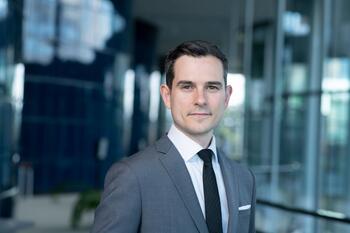 “Business students sometimes struggle with these questions,” the professor observed. And while “some of the MBA students are fully on board with those discussions,” they are, finally, “focused on the bottom line.” The lively result, Duguay said, is “some push-back” from business students “whose worldview is conditioned on maximizing profits, without regard to more open-ended, gray-area considerations.”
“Business students sometimes struggle with these questions,” the professor observed. And while “some of the MBA students are fully on board with those discussions,” they are, finally, “focused on the bottom line.” The lively result, Duguay said, is “some push-back” from business students “whose worldview is conditioned on maximizing profits, without regard to more open-ended, gray-area considerations.”
“The beauty of it,” Duguay said, “is to have the discussion.”
Vigor of the heart
Trevor Smith said this diversity of opinion creates a “vigor” that is intensely stimulating, and one of the chief virtues of the ANS-SOM connection.
“At divinity school, it’s a vigor of the heart … the passion arises from the calling,” he said. SOM students, in contrast, approach problems from “real-world perspectives.”
For I’noli Hall ’22 M.Div., the competing passions at times induced a feeling of conceptual “whiplash.”
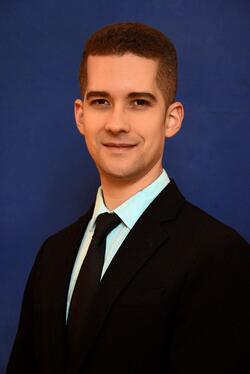 “We asked such different questions,” Hall said. For the SOM students, it was the inevitable “how do you turn a profit?” For the divinity cohort, it’s “how do we serve God and [build] community from a Christian perspective?”
“We asked such different questions,” Hall said. For the SOM students, it was the inevitable “how do you turn a profit?” For the divinity cohort, it’s “how do we serve God and [build] community from a Christian perspective?”
Despite the differences, Hall found his business-school colleagues to be “incredibly friendly” and said he felt “a sense of camaraderie” with them toward social issues. “I didn’t think their only concern was money,” he said. “Their vibe was different, but there was still a concern for the well-being of other people.”
Today, Hall is Executive Pastor of the Carpenter’s Shop International Church, an Assemblies of God church in Ahoskie, North Carolina. A member of the Chowanoke Indian Nation, he grew up amid the vestiges of Jim Crow prejudice, an experience that informs his ministry. He’d been in leadership roles at his church for three years before heading to YDS and Andover Newton, with an aim to “expand my theological foundation [and] enhance my practical experience.”
Like Smith, Hall was attracted to ANS in part for the way business studies are incorporated into the curriculum. He took four management courses at SOM, and two more at YDS.
“The very first course I took [at the School of Management] taught me how to test my assumptions,” Hall said. He was in a working group conducting an “impact measurement” on an American footwear company that donated shoes to developing countries. Their analysis revealed that the initiative’s apparent munificence actually had a negative impact on indigenous businesses.
“The course really helped me to think differently about the efficiency of different kinds of charity, and to ask, are we really helping with what we’re doing?” Hall said.
Very little in Dawn Jefferson’s background prepared her to think in raw business terms. Jefferson ’21 M.Div. had degrees in education and writing and had worked as a teacher and private-school dean for 12 years before YDS and Andover Newton. She was, she explained, “out at a queer, Black church in San Francisco,” when she decided to return to divinity school. “Going to seminary [allowed me] to engage in theology in terms of what it means to be queer,” and to serve “people at the margins.”
She’s not sure she would have found her way to courses in entrepreneurship and strategic management without the SOM requirement. “I would have felt overwhelmed by it,” she said. “I’m not a numbers person.”
Yet the experience proved fruitful and has helped frame her perspective as Minister for Mission and Justice at Hope United Church of Christ in Alexandria, Virginia. Discussing church reform, she spoke in the language of entrepreneurial risk.
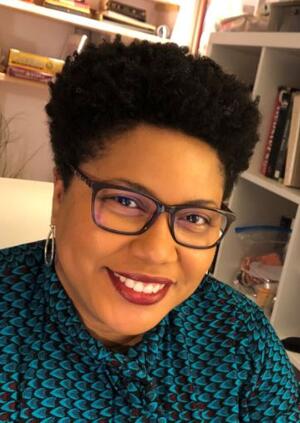
“How can the church be more entrepreneurial?” Jefferson asked. “Evangelizing is sales, in a sense.” But the goal is to “evangelize without being evangelical… . The entrepreneur conversation works better with this than the conversion model.”
“Aligning concepts of faith and risk has been very important to me,” she said. “There’s something about entrepreneurial moxie and strategy” that “really helped me as a pastor,” she continued, sounding very much like a person who’d absorbed the lessons of business management.
“Churches can’t live without money,” she declared, praising her experience at SOM. “It was helpful to merge in one’s psyche [the idea] that capitalism does not need to be our opponent.”
Timothy Cahill ’16 M.A.R. writes about the intersection of faith, ethics, and culture.










